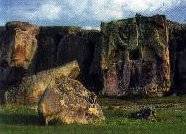 The province, known also as Afyonkarahisar, is located as a gateway between the Aegean sea and inner regions of Anatolia, locating at the crossroads of 3 different regions of Turkey. Afyon is bordered with Konya to the east, Usak to the west, Kutahya to the northwest, Denizli to the southwest, Burdur to the south, Isparta to the southeast, and Eskisehir to the north. Total area of Afyon is 14.570 square kilometers and its elevation is 1.034 meters (around 3400 feet) above sea level. The city has a continental climate; hot and dry summers, mild and rainy springs, cold and snowy winters.
The province, known also as Afyonkarahisar, is located as a gateway between the Aegean sea and inner regions of Anatolia, locating at the crossroads of 3 different regions of Turkey. Afyon is bordered with Konya to the east, Usak to the west, Kutahya to the northwest, Denizli to the southwest, Burdur to the south, Isparta to the southeast, and Eskisehir to the north. Total area of Afyon is 14.570 square kilometers and its elevation is 1.034 meters (around 3400 feet) above sea level. The city has a continental climate; hot and dry summers, mild and rainy springs, cold and snowy winters.
The history of Afyon dates back to 3000 BC. It was home to Hittites, Phrygians, Lydians, Persians, Greeks, Romans, Byzantines, Seljuks and Ottomans. The city is famous for its specific "Lokum Turkish Delight" and "Kaymak" (a kind of hard cream put on desserts), its "Sucuk" (special spicy sausages), its Opium fields (under strict supervision by the Government), its marble quarries, and for its various thermal baths.
Afyon is a spa-center with thermal baths in Gazligol Kaplicasi (25 km northwest), Gecek and Omerli Kaplicalari (15 km and 14 km northwest respectively), Hudai Kaplicasi 68 km southwest of the town, and Heybeli Kaplicasi at 30 km from city center. Sandikli is also famous for its mud baths, too. All these resorts have board and lodging facilities.
The Archaeological Museum and the War of Independence Memorial are places to visit in the city and to the north of Afyon there are Phrygian remains in the form of monumental cult rocks. Aslantas and Aslankaya are the largest of these. The lion relieves, which gave the name to these rocks are seen on sides of the rock and cult temples. This area is known as Phrygian Valley. Afyon Citadel which was built during the Byzantine period previously was used as a fortress by the Hittite King Mursil II, is another monument to see in the city. The citadel was called as Karahisar by the Seljuks, meaning Black Castle in Turkish. Ulu (Grand) Mosque and Altigoz bridge are other sites of interest. The town of Dazkiri on the Denizli highway is famous for its carpets and kilims.
Afyon has a small international festival celebrated during the week August 30th every year since 1998. It's an activity of concerts, exhibitions and folk dances, performed for 4 days in different locations.

